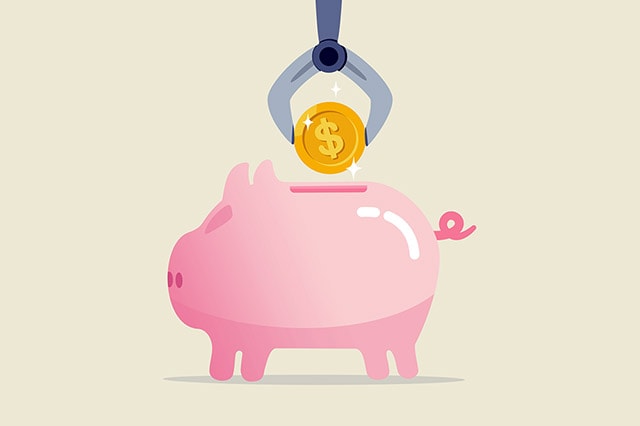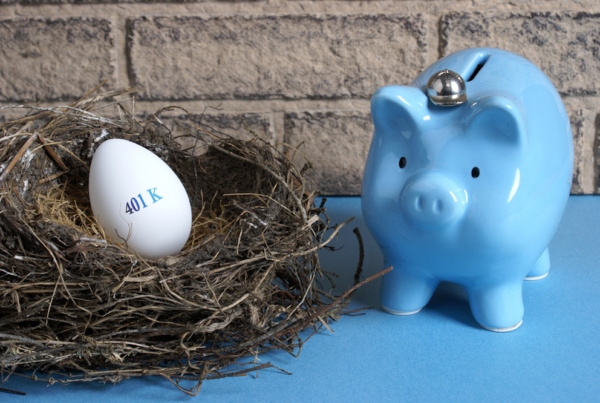Frugality is often looked at as a means of saving aggressively toward your retirement.
But that doesn’t mean you should stop being frugal once you get there.
Calm down, calm down—I’m not suggesting you forgo all luxuries once you’ve finally reached your hard-earned retirement. But one of the most important challenges you’ll face in retirement is achieving the lifestyle you want without burning through your nest egg too early, so why shouldn’t you keep up your focus on maximizing your dollar’s value? After all: Frugality should be a habit, and habits aren’t meant to be difficult.
Today, I’m going to talk to you about several frugal habits that, if you haven’t adopted them already, you can put to work ahead of or in retirement. Importantly, these habits won’t just help you save some tangible amount of money—they’ll ensure that when you spend your hard-earned cash, you’re getting the most in return for it.
How to Live More Frugally in Retirement

Don’t let anyone convince you that frugal is a dirty word. It’s not. Frugal is not the same as cheap.
While being frugal sometimes does involve buying things at a cheaper price, the mindset is less about finding the lowest absolute cost, but instead the best overall value.
In the following sections, I’ll elaborate on several frugal habits you might want to adopt in retirement.
1. Maintain Your Health

Benjamin Franklin once advised that “an ounce of prevention is worth a pound of cure.” From a health perspective, that starts with routinely visiting a doctor (like a primary care physician) and a dentist.
Americans commonly find themselves unable to afford medical and dental care. According to the Commonwealth Fund 2023 International Health Policy Survey, 46% of U.S. adults with lower or average incomes said they had a “cost-related access problem” in the past 12 months. Put differently, they skipped or delayed needed health care because of the cost.
The thing is, the worse a medical condition gets, the more it typically costs to treat. So one of the best ways to mitigate costs over the long run is to pony up for routine check-ups and screenings.
Fortunately, older adults often have access to a variety of free screenings, allowing them to catch many potential health issues early. Retirees with Medicare Part B are entitled to roughly two dozen free preventative services, for instance, though eligibility for these is also based on risk factors, age, and Medicare-determined time frames.
Whether you have Medicare or use other health insurance, ask about any free screenings you can have done. The habit of monitoring your health is more affordable than fixing deep-seated problems later.
Related: Don’t Overpay for Medicare: How to Avoid the Late Enrollment Penalty
2. Use Rewards Credit Cards

Older adults are much more likely to pay with cash than younger people. According to 2024 Findings from the Diary of Consumer Payment Choice, consumers age 55 and older used cash for 22% of payments in 2023, while people under age 55 only used cash for 12% of all payments.
Cash has its benefits. It can help you curb unnecessary spending and you can sometimes get a discount for using cash at small businesses looking to avoid expensive card processing fees.
But rewards credit cards have a number of advantages. From a frugality perspective: Rewards cards typically offer points or cash-back rewards, allowing you to stretch your dollar a little further. Plus, rewards cards also boast the perks inherent in many credit cards, such as fraud protection and additional warranty coverage.
Related: Does Your Credit Score Matter in Retirement?
3. Embrace Apps

Oh, I’m sick of downloading an app for every store, too. Believe me, I get it.
Nonetheless, real is real: Older adults are paying more than many of their younger counterparts for the same products if they haven’t downloaded apps for grocery stores, fast food, and entertainment.
A couple of examples?
Target’s app sometimes presents Target Circle deals, such as “Buy a $40 health-and-beauty purchase, earn a $10 Target gift card.” So if you were going to stock up on vitamins and similar products anyways, you might as well get $10 off your next visit.
Is McDonald’s your favorite fast-food treat? Patrons using the McDonald’s app can save a significant amount. The app offers limited-time deals such as free French fries (any size) with the purchase of any size soft drink, or a $1 10-piece box of McNuggets. (Deals can vary by region.)
So even if you don’t love the idea of downloading yet another store app, it could still save you money in the long run.
Related: Food Costing a Fortune? Here’s 12 Tips for How to Save Money on Groceries
4. Downsize Your Home

If you’re going to move during retirement anyways, you could reap a financial windfall by downsizing your home.
To start: Selling your current home and moving into one that costs less could leave you with a significant lump sum of money. Better still? If that’s your primary residence, you could be exempt from capital gains taxes on either the first $250,000 if you’re a single tax filer, or $500,000 if you’re married and file jointly.
Also, a smaller home often means lower utility bills and property taxes. You might have less cleaning and landscaping to be done, which means you could spend less on hiring people to do these tasks—or even take these tasks on yourself!
Another fringe benefit: Less space might help you curb your shopping habits. A physics concept attributed to Aristotle loosely translates to “nature abhors a vacuum.” Put differently: All spaces get filled. When you have a large home, you might feel the need to have pictures on every wall, books on every shelf, and plants on every table. A smaller home might encourage you to be more minimalistic.
To be clear: Not all retirees can downsize—you might be starting from a small home in the first place, you might plan on family living with you, or there might be other concerns that require a same-sized house in retirement as before it.
Related: Should I Pay Off My Mortgage Before I Retire?
5. Take Advantage of Senior Discounts

Have you been celebrating your 39th birthday for the past three decades? Cut it out! It might have been flattering to be carded in your 30s because you looked too young, but now that you’re older, I recommend embracing your age and taking advantage of as many senior discounts as possible.
You might be surprised how many discounted or even free things for seniors exist. Between more affordable meals, travel, and retail prices, you could be saving money on a weekly basis in retirement. Also, you can enhance your savings by becoming an AARP member so you get AARP discounts as well.
Lastly, don’t be shy about asking for a senior discount. Some businesses will actually offer senior discounts but not post them up front.
Say it with me: “Do you offer a senior discount?”
Related: 12 Free Things for Seniors to Do
6. Take Advantage of Tax Breaks

I wish taxes went away when we all stopped working. They don’t—but fortunately, there are several tax breaks for seniors to help ease your burden.
For example: If you’re at least 65 years old, your age automatically qualifies you for an additional standard deduction that can be added onto your regular standard deduction, and at least until 2028, a new Senior Deduction.
For the 2025 tax year, the extra amount of the additional standard deduction is $2,000 if you are single or file as head of household. The extra standard deduction is $1,600 per qualifying individual if you are married and filing jointly or separately. Plus, the additional standard deduction is doubled if you’ve reached the age requirement and are blind.
Also as a result of the passage of 2025’s budget reconciliation bill, taxpayers age 65 and older can take a new Senior Deduction. The deduction is for up to $6,000 ($12,000 for married couples filing jointly), depending on your income. It can be taken regardless of whether you itemize, and it can be taken in addition to the additional standard deduction. For now, the Senior Deduction is available for the 2025 through 2028 tax years. (Learn more about the Senior Deduction.)
Every year when you do your taxes, make sure you’re benefiting from any tax breaks you’re owed. Alternatively, you might have a tax professional spot opportunities for you.
Related: Federal Tax Brackets and Rates
7. Shop Secondhand

If you find yourself frequently muttering “they don’t make things like they used to,” you might want to check out some of your local thrift stores. By shopping at secondhand stores, you might be able to find vintage clothing that fits your taste, as well as other high-quality items that are made more cheaply today.
And, of course, you can save money at thrift stores. Not only can you enjoy the normal discounts, but if you’re no longer working, you might be better situated to shop on days where certain prices get reduced further, or when new stock hits the floor.
Also, per my suggestion above: Ask about senior and veteran discounts, because those could save you even more money.
Related: 10 Items You Should Always Buy Used
8. Prioritize Energy Efficiency

Utility bills are no joke. In a 2023 Hop Energy survey, 48% of respondents said they are stressed about the cost of utility bills, and 1 in 5 struggle to pay these bills on time.
And the financial pressure of utility bills doesn’t quit when you’re older. In fact, in some instances, you might face higher utility bills. After all, as you age, you might need more heat and light, or use more water as you take longer baths or showers.
If you don’t already have good energy-efficiency habits in place, now’s the time to start. A few simple starter tips:
- Draw your blinds during the day to provide more natural light and heat into the house.
- Turn off lights when you’re not using them.
- Get energy-efficient light bulbs (dimming optional).
- Install a low-flow showerhead.
- Install a smart thermostat.
- Ensure your home has proper insulation.
- Ensure your home doesn’t have leaky pipes.
Related: 10 ‘Frugal’ Habits That Aren’t Actually Saving You Money
9. Automate Paying Your Bills

Do you log into all of your bill accounts each month to transfer money or even write out physical checks? Well, consider automating your bill pay, instead.
Not only is manually tackling your bills an unnecessarily time-consuming process, but it can also be the more expensive route.
To start, if you forget about a bill, you might be subject to paying a late fee. If it’s a credit card bill, you might start paying some heavy interest.
But even if you’re diligent with your calendar reminders, you still might want to consider autopay for your bills. Why? Because some companies actually give you a slight discount for opting into automatic payments. For example, some major mobile phone companies, such as Verizon and AT&T, take a bit off of the bills for customers who opt in to autopay. This is also typical for federal and private student loans.
Who knows? You may enjoy the simplicity of automatic bill payments so much that you start automating your savings as well.
Related: How Long Will My Savings Last in Retirement? 4 Withdrawal Strategies
10. Talk to a Financial Advisor

The financial world can be difficult to navigate. Even if you’ve handled your own finances thus far in life, you could benefit from routinely talking to a financial advisor about any number of retirement financial issues—from basic spending, saving, and budgeting advice to real estate planning, investment adjustments, and tax mitigation.
It’s recommended that you check in with your financial advisor at least once a year, though you might want to do so sooner if you’ve just been through a major life event (like a divorce or death in the family), or if you’re planning on making a large purchase (a car, a home, and so on).
Too-frequent meetings might not be very productive. But you should make it a habit to occasionally check in and ensure your finances are on track.
Related: How Much Does Financial Advice Cost?







![Should You Max Out Your 401(k) Each Year? [Yes...and No] 26 should you max out your 401k each year or invest elsewhere](https://youngandtheinvested.com/wp-content/uploads/should-you-max-out-your-401k-each-year-or-invest-elsewhere-600x403.jpg)
